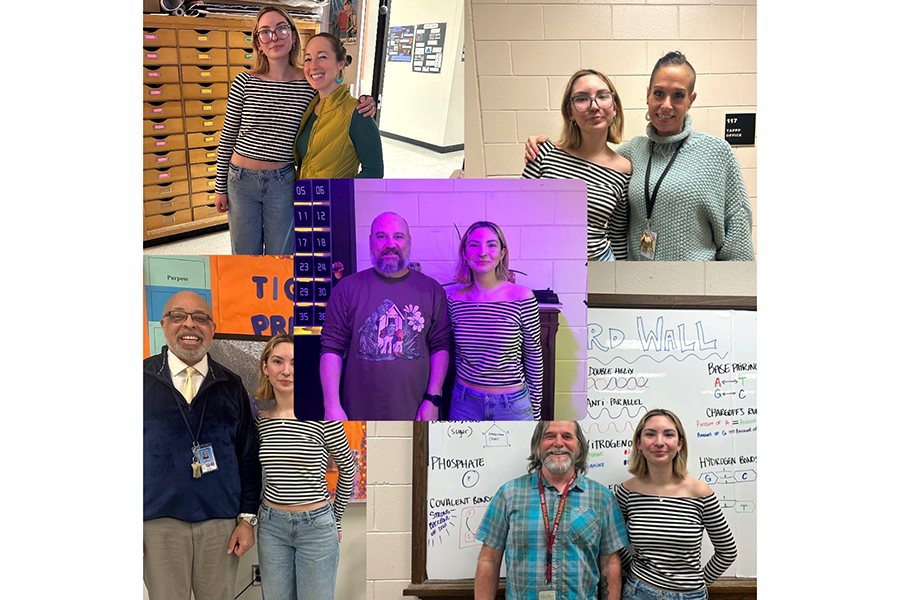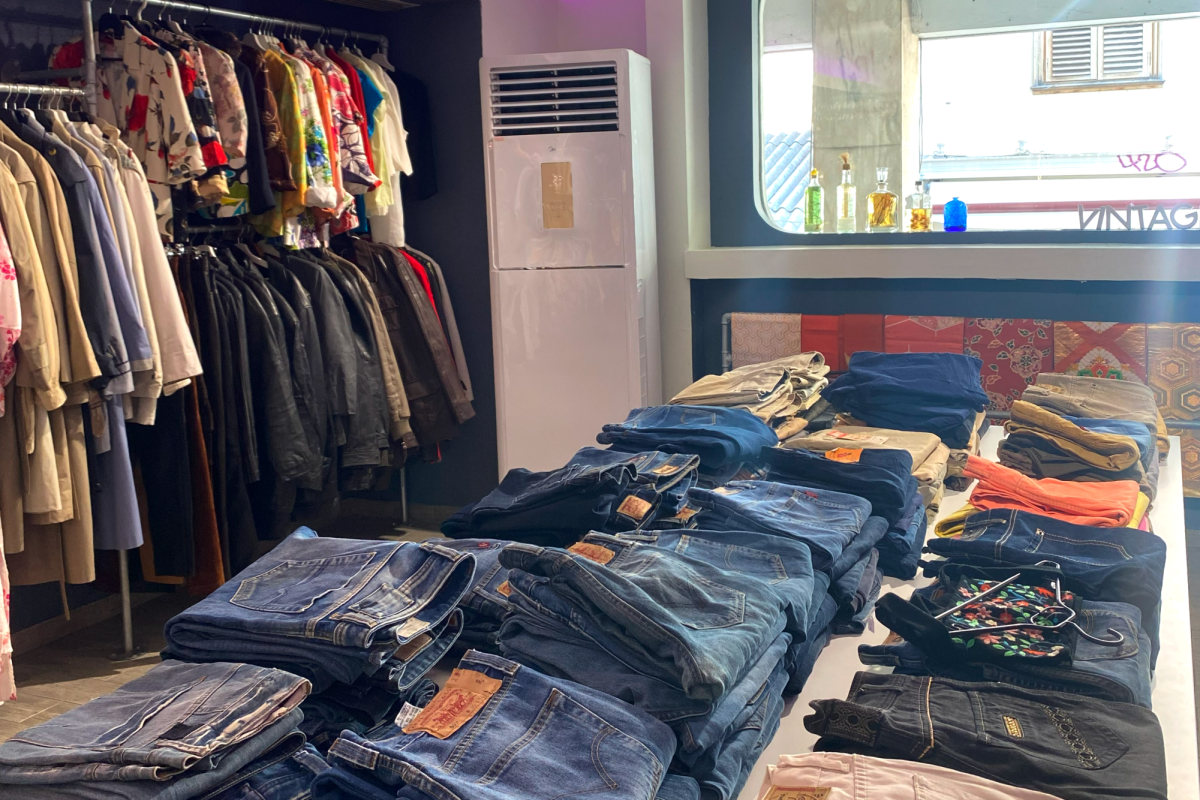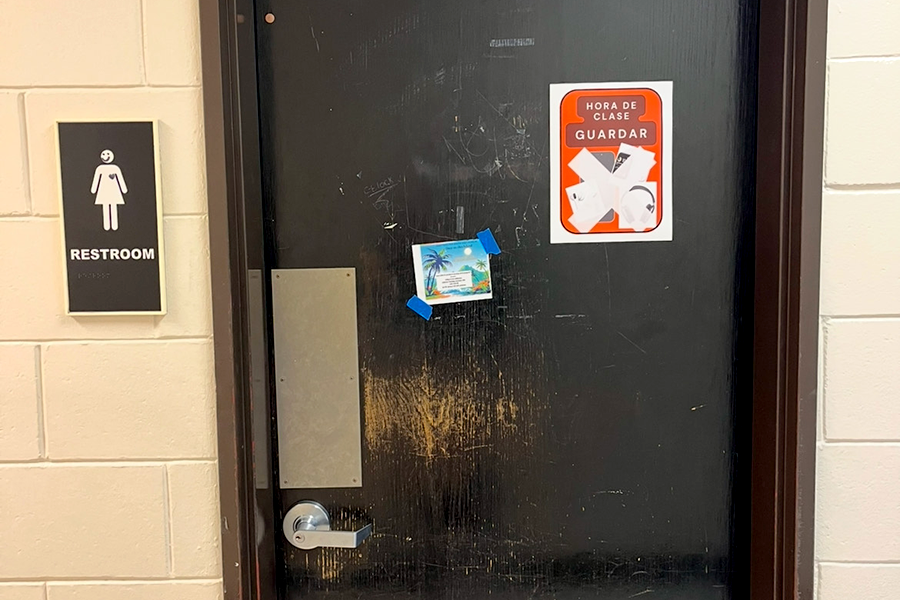On a typical day, I enter South through the main doors at the facade of the building, brushing shoulders with the herd of students that surround me. The familiar feeling of slowly shuffling through the crowd felt distant as I stood alone, arms crossed against the brisk morning air. I watched each bus unload, through the diamonds of the chain-link fence, until junior Dmitri Littlewolf and Ed Bourgeois made their way to the door.
We entered the school, and the murmurs and constant buzzing of the crowd were replaced by the subtle whizzing of Dmitri’s motorized wheelchair. Enrolled in the Physical and Other Health Impairments program, also known as POHI, Dmitri’s daily schedule is unique to that of nearly any other routine in the building. As we made our first stop at Dmitri’s locker, it was already apparent to me that my day with Dmitri would be far from what I was accustomed to.
Bourgeois began to twist the combination lock, hanging up a baseball cap and blanket which Dmitri had worn into the building. Although these tasks appear to be simple, due to his limited mobility, Dmitri has relied on Bourgeois as his Special Education Assistant, or SEA, since the start of freshman year.
We then made our way around the corner to his first class of the morning, the primary focus being responsible citizenship. I followed Dmitri into the brightly lit classroom, and he wasted no time before introducing me to his fellow classmates, friends, and teacher Emily Andrews, all of whom seemed excited about me being his “paparazzi” for the day. The class was no larger than fifteen students, some of whom were also accompanied by SEAs.
“I open it,” said Dmitri, referring to the folder in front of him. “Come on, come on,” Bourgeois gently coaxed, waiting patiently for Dmitri to complete the task. Andrews began the class by playing the daily CNN student news, which was followed by a “state of the week” quiz on Louisiana.
“Bring it on!” exclaimed Dmitri, as Andrews began to pass out the multiple choice quiz to the class. Bourgeois read the questions aloud to Dmitri, and after repeating each question a couple of times, circled Dmitri’s final answer. Ten minutes prior to the screeching of the bell, we left the class. “Come on,” Dmitri said to me, as we embarked down the hall.
The room Dmitri brought me to next was one that I had never seen before in my three years of attending South. The room was limited for space, and I made my way to the back corner. It was clear that Bourgeois and physical therapist Lynn Eliason were going to need all the space they could get in order to transition Dmitri from his wheelchair to the gait trainer.
Although Dmitri spends the majority of his day transporting by electric wheelchair, one hour of his day is spent on the gait trainer, a device commonly used for the physically impaired. The gait trainer, which essentially gives Dmitri the ability to walk, has become a part of his physical therapy routine as it can help with muscle retention and development, circulation, respiratory therapy, as well as presenting new opportunities to socialize throughout the building.
“Is that all you got?” said Bourgeois, enthusiastically taunting Dmitri to continue traveling down the hall, occasionally clapping to keep his attention forward. On our two laps around the first floor, Dmitri cheerfully greeted just about everyone we passed. The staff members we passed were obviously familiar with this part of Dmitri’s routine, as well as the frequent hall wanderers. During these daily strolls on the gait trainer, Dmitri explained that he looks forward to interacting with the babies from the in school daycare that are often found cavorting around the commons while the rest of the student body is in class.
After completing two full laps of the first floor, it was time for Dmitri to leave the mobility of the gait trainer behind, in order to reach his next class before the rush of passing time. It was upstairs on our way to the choir room that Bourgeois pointed out one of South’s major accessibility flaws.
As we made our way down one of the narrow second floor hallways, a single classroom door left ajar stood in our way. Bourgeois explained that one door left open in the hallway can cut the space of the hallway in half, making it much harder to move around the second floor.
Our destination of the choir room was located on the direct opposite side of the school from South’s single elevator, so our distance to travel wasn’t short. Once we arrived, the room appeared to be dark inside, while a note taped to the door read that the class would be meeting in the band room directly below us. For most students the trip from the choir room to the band room would only take a matter of seconds, but for us this required traveling all the way back to the elevator located on the opposite end of the school.
As soon as the drone of the bell went off, we found ourselves caught in the flood of students that encompassed us, leaving not much of a choice but to move aside and wait for the unrelenting traffic to clear. We reached the band room to discover the class had already moved back upstairs.
Bourgeois has hoped for the addition of a second elevator, just to make accessibility throughout the school a little easier. The metal door frames with the metal bar running down the middle have also proven to be an obstacle, in that the doors are so narrow that Bourgeois is unable control Dmitri’s chair while passing through them.
After arriving at the choir room for the second time, Dmitri positioned himself right outside the door. Due to the temperatures being too high within the room, Dmitri must watch and sing outside the classroom. Bourgeois explained that if inside the room, the temperature within the compact space can cause discomfort to Dmitri.
We did not spend long outside the choir room before news came that a fire drill was going to take place. This fire drill was not school-wide, but designed specifically for students enrolled in the various programs of the Learning Center. We were instructed to cram inside a room located between two rows of lockers on the balcony. The room acts a designated safe place for these students on the second floor, mainly because it is one of the few rooms within the school built with pure steel fire-resistant doors. After being packed tightly together in the small room for a few minutes, we were given the go ahead to each continue with our day.
After an afternoon break for lunch, Dmitri and I waited in the hall for his second SEA of the day, Laura Moynihan. Waiting with us were a few of Dmitri’s friends and classmates, Dmitri referring to the daily meet-up as a “hallway party”. After meeting Laura, I took a seat in Dmitri’s next class, the core focus being on various study skills and activities. Before starting on his assignments, Dmitri asked me if I knew anything about the Charlie Brown Christmas special. After giving me a detailed summary of the special, it became clear where he’d acquired his signature catchphrase, “good grief.”
Once he had finished discussing the plot of the Charlie Brown Thanksgiving special, Dmitri began to work on some practice math problems, mainly consisting of basic multiplication and division. This was followed by the reading of various short stories, with a few comprehension questions at the end of each story. Although coming up with an answer or deciphering certain words can be a challenge for Dmitri, through Laura’s persistence to keep him focused, Dmitri was able to answer the questions given to him.
Though Dmitri spends a lot of time honing math and reading skills, Dmitri has also been able to take advantage of some more unconventional learning styles. Almost immediately as we entered the room of South’s speech therapist Julie Schoborg, Dmitri made his way over to a computer in the corner, with the hope of playing a computer game favorite, “Fripples.” Through problem solving activities within the game, Dmitri is able to work on strengthening his own memory ability, since he can sometimes struggle with short term memory and keeping focus on certain tasks.
Schoborg explained that Dmitri has made immense progress through the game, and even through certain apps available on the iPad. By having access to this technology Dmitri has learned how to use email, visit some of his favorite websites, and even use Skype. Next year Schoborg added that she hopes to work on expanding Dmitri’s social skills through devices like the computer and iPad, on top of the progress that has already been made.
Teaching appropriate social skills and manners are both primary goals in Jody Hickman’s social success class. As we all took a seat around the wooden table, Hickman made it clear to the class that we were to keep our elbows off the table while playing the game of Jenga. The goal of the game being to keep the stack of wooden blocks from falling, while slowly removing blocks from the tower. Tension began to build as the wooden structure became less stable, leaning with a slight wobble. “Dmitri Littlewolf is the name, the chair is the game,” exclaimed Dmitri, declaring himself captain of Jenga.
Once the day had come to an end, it was made clear to me that Dmitri and I, though both juniors, have had very different high school experiences. The challenges Dmitri faces everyday come by limited mobility, and even the overall accessibility of the school. But despite these obstacles, Dmitri’s high school experience has nonetheless been a positive one. “He loves coming here,” said Bourgeois, “he really loves every part about it.”






